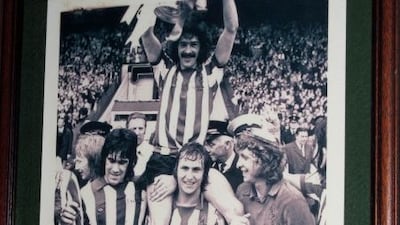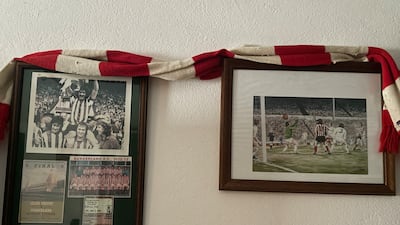Fifty years this weekend from the famous FA Cup final where unfancied, second-tier Sunderland defeated Leeds United, then a mighty force in English and European football, Jimmy Montgomery remembers his moment of goalkeeping glory as if it happened yesterday.
Montgomery produced the astonishing double save, often described as the best in footballing history, that preserved the one-goal lead Ian Porterfield had given Sunderland in the first half.
You need to be of a certain age to have seen it on the day, May 5, 1973. But one way or the other, millions upon millions have viewed the footage.
It shows “Monty” – as I have known him since I was an eager if limited schoolboy goalkeeper spending every other Saturday afternoon on the terraces of Sunderland’s former stadium, Roker Park, longing to be as good as him – diving to push out Trevor Cherry’s powerful header.
He then has to act with lightning-fast instinct as Peter Lorimer follows up with the easy conversion; the shot is firm and goal-bound but somehow Monty tips the ball on to the crossbar.
It was the incident that defined Monty’s career. But he has no first-hand memory of another enduring image, the sight of Sunderland’s manager Bob Stokoe, in familiar trench coat and trilby, beginning a dash across the Wembley turf to embrace his goal-stopping hero.
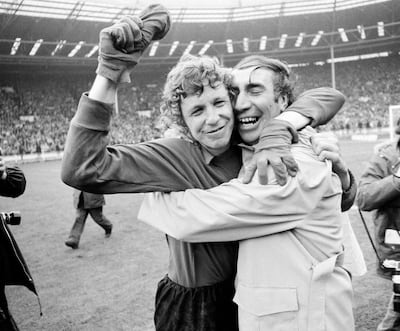
“I had turned my back to applaud our fans behind the goal,” Monty tells The National from home on his native Wearside, where passion for the team he supported as a boy before joining as a player is intense enough to survive chronic disappointment on the field.
“By the time I did a half-turn and saw Bob coming, he was barely 10 yards from me. He just flung his arms around me.”
Otherwise, his recollections remain completely fresh.
“When I watch the game now, I can tell you at every point what happens next. Mind, I’ve seen it a few times. It’s obviously very special to me, a wonderful thing to have been part of.”
To understand the scale of Sunderland’s achievement in defeating Leeds, a comparison of the two clubs’ status in 1973 is illuminating.

Don Revie’s Leeds were the cup holders, finished third top of Division One, the equivalent of today’s Premier League, and went on the win the title the following season.
They were also the beaten finalists in the 1973 European Cup Winners’ Cup.
Then as now, Sunderland were in a second tier dominated by Burnley.
The club had a great history but on the weekend of King Charles III’s coronation, it is worth noting that three of their six top-flight titles were accomplished when Queen Victoria was on the throne.
And the last FA Cup trophy was won in 1937, five months after the abdication of Edward VIII. In 1973, few gave them a chance against such elite opposition.
But Sunderland’s fervent fans were full of optimism. As one of them, I tried my best to obtain a ticket. But they were like gold dust; along with many thousands more, I had to settle for the television.
My wife still remembers my roar through an open window as she returned home from shopping just as Porterfield’s shot hit the back of the net.
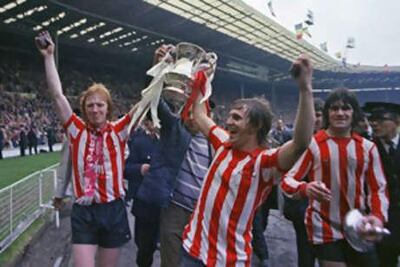
“The effect on the town [Sunderland was not awarded city status until 1992] was unbelievable,” says Monty. “Productivity levels shot up and it completely rejuvenated the whole area.
"You have to remember that the FA Cup was huge then. It was every player’s dream to win it.”
Victory at Wembley still brings a taste of European competition, but only in the Europa League, which lacks the glamour of the European Cup Winners’ Cup.
The London branch of the Sunderland AFC Supporters Association called its magazine 5573 in honour the date of the FA Cup final victory.
It was changed to Wear Down South in 2001 when members – especially younger ones not even born in 1973 – tired of the constant reminder of how long had passed without another top trophy.
As followers of Sunderland relish a special anniversary, one Leeds fans prefer to forget, the coming 2023 final would seem a relatively low-key event if it were not to be the first Manchester derby – City versus United – in the competition’s history.
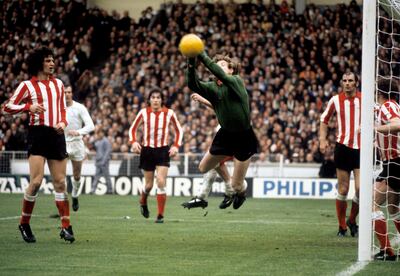
However tantalising that clash may be, with the added prospect of a City league-and-cup double, the diminishing allure of the FA Cup surely relegates it to insignificance compared with the sheer romance of underdogs triumphing against all odds.
Of course a Sunderland fan would say so, but countless neutrals also see 1973 as one of Wembley’s three legendary finals – the others being the “White Horse” final between Bolton Wanderers and West Ham United in 1923, when so many fans flooded into the stadium that mounted police had to clear the pitch for the game to proceed, and the “Matthews final” of 1953, marked by Sir Stanley Matthews' mesmerising display as Blackpool beat Bolton 4-3.
Of the key people involved in the high drama of May 5, 1973, the goalscorer Porterfield and manager Stokoe are now dead, as are Sunderland’s Scottish forward Billy Hughes and, on the Leeds side, Revie, Bremner, Lorimer, Hunter and Cherry.
Monty is in his 80th year, still a Sunderland AFC ambassador hosting pre-match reunion lunches and still healthy (“usual ailments of age – I just keep taking the tablets”).
Sunderland survivors of an extraordinary achievement have joined him for commemorative reunions at the Stadium of Light, probably glancing at the statue of Stokoe on arrival outside the ground.
Meanwhile Leeds have not finished as champions for 31 years and are locked in a desperate struggle for Premier League survival.
After four miserable seasons in the third tier, Sunderland have had a satisfying season back in the Championship, a talented young side playing attractive football and still with a glimmer of hope of reaching the promotion play-offs.
Stokoe would be 92 if he were alive today, Revie 95. Only a supreme optimist would predict major silverware any time soon for the clubs they led to Wembley in 1973.
But for Jimmy Montgomery, the Sunderland-born, Sunderland-mad boy who grew up to taste Wembley glory, memories linger.
The victory parade in an open-topped double-decker bus followed a 20-kilomtre route from Durham to Roker Park lined by hundreds of thousands.
“Playing for the local club, my club, representing my town, you can understand what it was like,” he once told me.
“To bring the cup back to Sunderland, to have that parade – we knew nothing about it before – was absolutely unbelievable. It was a dream coming true.”
· Colin Randall is a former executive editor of The National and edited the Salut! Sunderland fan site from 2007 to 2019.



